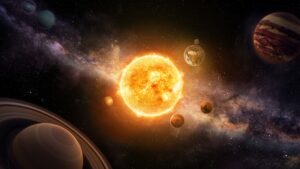
Multiculturalism in the 21st Century
It’s rather strange that it had taken some 9,000-10,000 years (according to present knowledge and historical records) since we emerged from our villages and towns, to finally witness the planet from afar, as one singular home for our species. From that vantage point the least you think about are cultural differences, language barriers, ethnicities, political arguments, and ideological debates. You are confronted by an awe-inspiring spectacle. A huge blue white green and brown mosaic containing the most intricate network of life support systems and an elaborate and astounding level of ecology, along with 8 billion + fellow humans, and countless billions of other organisms.
However, if one really considers the march of all the Holy Messages that have been revealed to mankind during that same period of time, one can see a very clear and distinct underlying theme, or concept, being taught to humanity, in successively increasing complexity and more detail with each iteration. If you wish to start with Adam, or Noah, or Abraham and all the way down to God’s latest Manifestation for this age, Baha’u’llah. This has not been confined to theologians, or Divine Teachings, either. Philosophers, poets, artists, scientists, thinkers and seers alike expressed their longing, and their deeply held convictions, that we are all one family, and that in the fullness of time this planet would emerge as one country – one home for all of humanity.
“The earth is but one country, and mankind its citizens” is a renowned quote by Baháʼu’lláh, the Prophet-Founder of the Baháʼí Faith.
So, in real terms, multiculturalism is in fact the essence and the cornerstone of our civilization. A few millennia ago, in the land known as Mesopotamia, there lived and co-existed countless groups of people who spoke different languages, from all the 4 corners of that empire – in ancient Babylonia. In fact, the name of the city state, Babel, is given to mean a place where multilingualism was very common, and while this city embraced so many different cultures, it nevertheless thrived and was distinguished by its many unique features and traditions.
Here we are today. In 2025. People from different nationalities and countries, speaking different languages, are working together, constructing super projects, undertaking massive endeavours and expanding the sphere of our knowledge & experience. The International Space Station is surely one such concrete example, poised several miles above the surface of the earth, not bound by any political borders or arguments.
Yet, in someone’s mind, the analogy is so striking and so visceral and real:
This planet itself is an orbiting station, if you really think about it! We are bound within its gravity and supported by its biosphere. We are all travelling through the immensity of space and time on this Pale Blue Dot, and have been doing so for eons, and perhaps will continue to do so for as long as our sun keeps shining brightly. With this outwardly looking perspective, we are all companions and fellow travelers on the same ship. How illogical and how unsustainable it would be that we should not consider multiculturalism, mutualism; more so that unity not to be of the utmost importance and relevance to our prosperity, and our existence even.
Why would anyone not want to promote conditions that are conducive to the wellbeing and development of our civilization? Why would we not want to leave petty and shallow differences behind? Act as to jeopardise the integrity of this ‘ship’, Mother Earth, that has carried our ancestors, and their ancestors, since we emerged on the surface of this planet?
All the differences that we have in the large collection of traditions, cultures, languages, beliefs, and histories, in an instant, can be seen as a source of wonder, of appreciation, of an opportunity to learn, expand, share, compromise, sacrifice, embrace, and rise above yesterday, and above that which is not useful, or futile, for our wellbeing and future as one family.
To see ourselves as belonging to one planet, one country, one common home, is not a fanciful idea nor is it an idealistic Utopian dream. It is in fact the very next phase of our collective evolution as a species, and as a forward-looking civilized community: the unification of mankind. Its establishment is an existential imperative, as otherwise, life and progress, would utterly and completely be impossible and unsustainable.
By Sam Saté-Askew